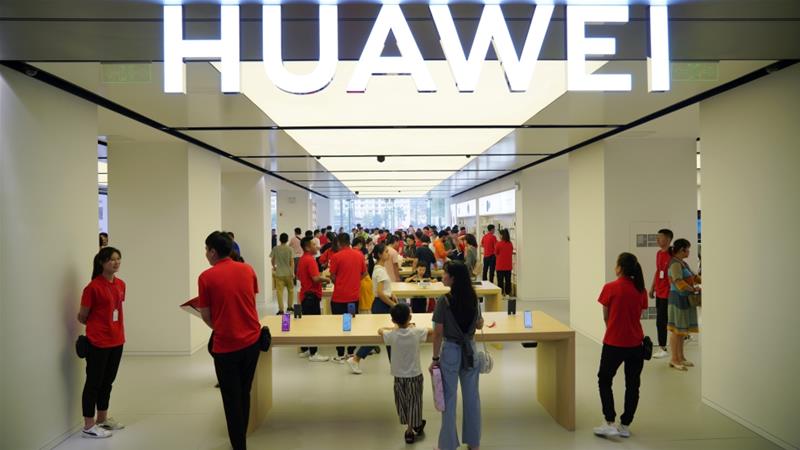Comment comes day after Chinese telecom giant blames Washington for hacking its systems and trying to steal data. While the US has not provided ample evidence that Huawei helps the Chinese government in spying, the company also did not give proof of the US allegedly hacking the telecom giant's systems [File: Stringer/Reuters]
President Donald Trump has said the United Statesdoes not want to discuss with China the blacklisting of Huawei Technologies, as the two biggest world economies try to tamp down trade tensions.
"It's a national security concern," Trump told reporters at the White House on Wednesday. "Huawei is a big concern of our military, of our intelligence agencies, and we are not doing business with Huawei."
"And we'll see what happens with respect to China, but Huawei has been not a player that we want to discuss, [that] we want to talk about right now," said Trump, one day after Huawei accused the US of a cyberattack on the company.
It was unclear whether Trump's comments indicated a change on whether he would be open to discussing the Chinese tech giant in trade talks with Beijing.
Trump and Chinese President Xi Jinping this summer agreed the US would ease restrictions on Huawei Technologies Co Ltd, as China promised to make unspecified purchases of US farm products.
Washington placed Huawei on the Commerce Department's so-called entity list in May over national security concerns. US parts and components generally cannot be sold to those on the list without special licences.
Lack of evidence?
Chinese telecom equipment maker Huawei accused US authorities on Tuesday of attempting to break into its information systems and trying to coerce employees to gather information on the company.
Huawei, which faces mounting American pressure - including possible loss of access to US technology - over accusations that the company is a security risk, said in a statement on Wednesday that Washington had used "unscrupulous means" in recent months to disrupt its business.
Huawei, headquartered in the southern city of Shenzhen, has seemingly provided no proof to support its accusations against the US. A company spokesman told the Associated Press he had no additional details.
The accusations were included in a statement about an unrelated patent dispute in the US.
The Huawei statement said the US launched cyberattacks "to infiltrate Huawei's intranet and internal information systems" but gave no indication of what information it targeted or whether it succeeded.
Huawei also said FBI agents pressured its employees to collect information on the company.
The Reuters news agency cited a Huawei document it said listed eight employees - all executives, including several US citizens - who were involved in the incidents. It said the latest occurred on August 28 when an employee informed Huawei that the FBI asked the person to be an informant.
The company said US authorities had interfered with Huawei by delaying shipments, denying visas and unspecified intimidation.
Mutual recriminations
Meanwhile, US officials have yet to give substantial evidence to support claims that Huawei aids Chinese spying, accusations the company denies. The US, along with Australia, Japan and some other governments, have imposed restrictions on the use of Huawei technology.
Huawei Technologies Ltd. is the second-largest global smartphone brand and the biggest maker of network gear for phone companies.
Export controls announced by the Trump administration in May would limit Huawei's access to US technology. But implementation has been postponed to mid-November.
The US is lobbying European governments to exclude Huawei from next-generation telecom networks. However, Germany, France and Ireland say they have no plans to ban any supplier.
Huawei is also facing a variety of charges in the US to which it has pleaded not guilty. In one case, US prosecutors asked a judge on Wednesday to disqualify a former deputy attorney general as the electronics firm's lead defence lawyer because he had access to classified information from an earlier investigation related to the company.
China's government has accused Washington of improperly using national security arguments to hurt Chinese commercial competitors.
"This kind of behaviour is neither glorious nor moral," a foreign ministry spokesman, Geng Shuang, said on Wednesday. He called on Washington to "stop deliberately smearing" Chinese companies and to "provide a level playing field" for them.
SOURCE: NEWS AGENCIES



